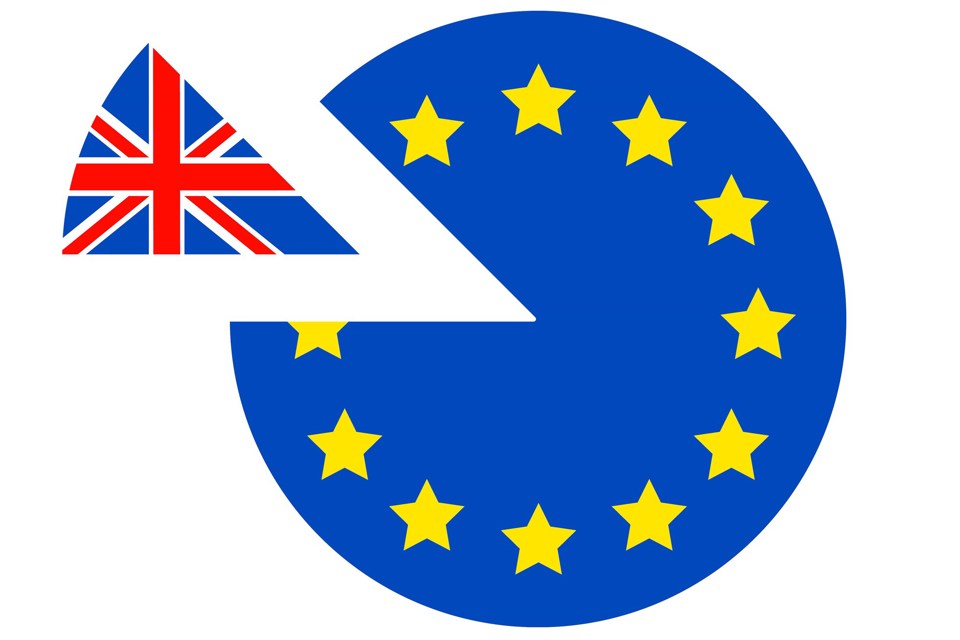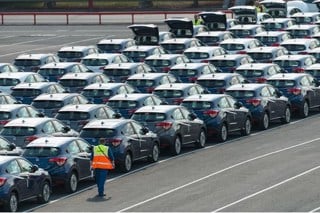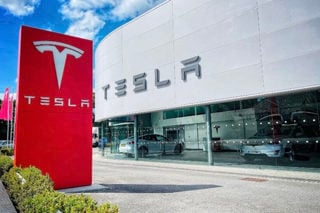A full month before voters flocked to polling stations to decide the fate of the nation’s membership of the European Union, AM’s poll of the motor retail industry predicted 52% would be in favour of leaving.
While that early indication of the political mood among our online readers was not reflected by the response gleaned in a separate poll of the AM100 – in which 75% expressed a desire to remain in the EU – it ultimately proved accurate on June 23.
However, the consequences of the UK’s decision are far less predictable.
At the start of July, Mike Hawes, SMMT chief executive, said: “It is far too soon to determine whether the referendum result has had an impact on the new car market.
“The first six months saw strong demand at record levels, but the market undoubtedly cooled over the second quarter.”
Although retail registrations in the first quarter of 2016 were up 5.9% year-on-year, performance in Q2 fell 3.4% and June was the third consecutive month of falls in private retail registrations. At least some of this fall has been attributed to uncertainty over the outcome of the referendum.
Total registrations fell 0.8% in June, only the second month in the past four years that registrations have fallen year-on-year.
“So far there is no noticeable change, with order take holding up and in line with supply. We are concerned that manufacturers will take action if the pound-to-euro exchange rate hurts imports.”Philip Maskell, chairman, Essex Auto Group
Sue Robinson, director of the National Franchised Dealers Association (NFDA), said it had heard mixed messages from dealers, and while physical footfall increased in June year-on-year, online activity seems to have declined: “With consumer confidence falling post-Brexit, we call upon the Treasury and the Bank of England to do all they can to stimulate consumer demand. We currently import over a million cars a year and associated parts from the EU. We urge our politicians to swiftly negotiate a trade deal with the union in order to safeguard a prosperous future for the motor retail industry.”
Although fleet registrations have been propping up the overall market, they too may be at risk.
Since most business’ budgets were set last autumn and most fleet deals are settled three months in advance of completion, many fear a delayed reaction to Britain’s vote to leave the EU.
Colin Tourick, Grant Thornton professor of automotive management at the University of Buckingham business school, said the long-term impacts of Brexit were as yet unknown, but added: “In the short term, fleet budgets are likely to be blown out of the water. Fuel costs and new vehicle costs will rise, because sterling will fall.”
Analysts at IHS Automotive have cut their UK vehicle sales predictions for 2016 by 220,000-250,000 and substantially reduced GDP growth forecasts to 1.5% (from 2.0%) for 2016, to 0.2% (from 2.4%) for 2017, and to 1.3% (from 2.3%) for 2018.
Grant Thornton also predicted “softening of demand in the short term”.
Tarun Mistry, head of financial services corporate finance, said: “It is vital that we see clarity at the earliest opportunity around our future relationship with the EU.”
“My focus is on the immediate task of executing an effective Q3 strategy. The next three months of trading are going to be crucial to a profitable 2016.”Nathan Tomlinson, MD, Devonshire Motors
Hawes agreed: “It’s important government takes every measure to restore business and economic confidence to avoid the market contracting in the coming months.”
Among the concerns that UK dealer groups are facing are wider market uncertainty – share prices of the listed PLCs have fallen by between 15% and 51% since January 1, suggestions that vehicle prices could increase due to the fall in the value of sterling, and the potential introduction of EU import tariffs. On the legislative side, Brexit may lead to changes in data protection rules and the General Block Exemption Regulations (BER).
Senior UK industry figures have said removing the UK from the BER could give manufacturers room to change the business model.
Prof Jim Saker, director of the Centre for Automotive Management at Loughborough University’s Business School, said: “Brexit would really hand power to manufacturers in the supply chain relationship. What they choose to do with that power is not known.” (Read his full column here.)
Glass’s said the effects of the Brexit vote will not be felt by the automotive sector until Q4.
Rupert Pontin, director of valuations, described the current climate as “the calm before the storm”, with larger-scale economic issues to emerge as lenders’ willingness to deliver finance into the retail and housing markets becomes apparent later in the year.
“Nothing changed as yet, actually had a pretty strong finish to a pretty flat June. My concern is manufacturers will be hit due to currency fluctuations, which could lead to lesser consumer offers and bonuses”Robin Appleyard, MD, Colin Appleyard
As AM's August issue was going to press, the Bank Of England had announced it would hold interest rates at 0.5%, but minutes from the meeting of the bank’s Monetary Policy Committee revealed that most members of the committee expected the rate to fall at the August meeting.
Pontin said: “What is challenging, if not impossible to predict, is how strongly all of these factors will affect the car market.”
Many dealers told AM they have yet to feel the effects, but did concede that there was an onus on them to maintain a positive outlook for fear of turning Brexit’s potential pitfalls into a “self-fulfilling prophecy”.
John Smyth, director at Swansway Group, said: “So far, we have seen no huge drop-off . Over 50% of our customers voted to leave the EU and their attitude to buying a car doesn’t seem to have been affected.
“It’s obvious that the drop in the pound means greater cost for those manufacturers importing cars and we are concerned about the effects of that because for some time our customers have been picking up great deals driven by the exchange rate.
Read: What the exchange rate fall means for UK car dealers
“If we were planning to acquire at the moment, I’m sure we’d be more guarded.
“There have been ‘effects’ for some time in the lead-up to the vote – not to be confused with a normal slowdown in May and June. I don’t expect any significant change. The press have hyped the whole situation to a point where the ‘man in the street’ is getting a little confused"Clive Brook, MD, Clive Brook Volvo
“We have to maintain a positive outlook for our staff and customers though, otherwise all our fears could easily become a self-fulfilling prophecy.”
Nigel Shaw, JCT600 group finance director, said: “We were seeing volumes decline in the run-up to the referendum, but there has been no dramatic change since the vote.
“HSBC tells us that, for now at least, it remains business as usual.
“The message from John Tordoff is ‘Europe still wants to sell us cars and we have customers wanting to buy them, so let’s get on with it’.”
The impact on property
The constraints placed upon retailers’ own growth plans might be best indicated by automotive property consultant APC, which has predicted a fall in transactions in 2017.
Its summer statement said the Brexit vote would likely lead to “a period of sales growth erosion”, but added: “Compared to the 10-year trend, there is not, though, expected to be any significant fall and indeed this easing in sales push may well enable retailers to reinforce profit margins.”
“We’re in a positive place business-wise and will not dwell on what might have been in the referendum. What difference does it make? We’ve got a job to do. And with our PCP finance offers, they’re a perfect no-worry product”David Cox, MD, Cox Motor Group, & chairman of Honda dealer council
Property prices and rising wages have been blamed for difficult trading conditions for London dealerships in recent years and it seems that those operating in the capital may also be more vulnerable to the effects of Brexit.
Coachworks Consulting canvassed the views of dealers and found a mixed response to the referendum vote to leave the EU.
Managing director Karl Davis said: “Early signs among our contacts are that London and the South East may be feeling the impact of the vote to leave the EU harder than the North.
“In the South East, one client said that in the three weeks leading up the vote enquiries slowed dramatically in their London dealerships and remain slow still, but further away, they have returned to expected levels.”
Listed dealer groups
Zeus Capital head of research, Mike Allen, said PLCs were operating in “uncharted waters” following the Brexit vote.
Allen said those with stocks that have been oversold, with flexible balance sheets, would continue to appeal to investors. He said Cambria and Vertu both fit these criteria. Zeus is a broker for Cambria and Vertu.
Inchcape’s overseas exposure against a weak sterling should give it some protection, backed by a strong balance sheet, he said, adding: “We believe that Lookers and Pendragon have also been oversold, but remain nervous on Marshall Motor Holdings, following its recent decision to gear up by purchasing Ridgeway.”
Allen said: “In our view, the real uncertainty is on 2017 and 2018, but we believe it is too early to quantify this at this stage.
“We believe that the comparison to 2008 is overdone with most companies having better balance sheets and systems, and also benefitting from shorter buying cycles via PCP, giving greater visibility on earnings.”
Manufacturers have also begun to shift from 36- to 48-month PCP offers, LINK which could be an indicator that brands are moving to longer-term finance solutions to guard against the immediate economic uncertainty and the potential risks to customers’ buying power.
For most dealer bosses, however, it seems that dealing with the Brexit effect in the immediate term is their main priority.
 Back when AM took a poll of readers’ views on Brexit, in May, just 18% said that they had discussed the possibility of an EU departure with their manufacturer partner and 5% had sought advice on how to approach the challenges ahead.
Back when AM took a poll of readers’ views on Brexit, in May, just 18% said that they had discussed the possibility of an EU departure with their manufacturer partner and 5% had sought advice on how to approach the challenges ahead.
None of those questioned after the vote had sought any specialist advice in light of the nation’s decision.
Nathan Tomlinson, managing director of Devonshire Motors, said: “At this moment in time, my focus is on the immediate task of executing an effective Q3 strategy. The next three months of trading are going to be crucial to a profitable 2016.”



















Login to comment
Comments
No comments have been made yet.